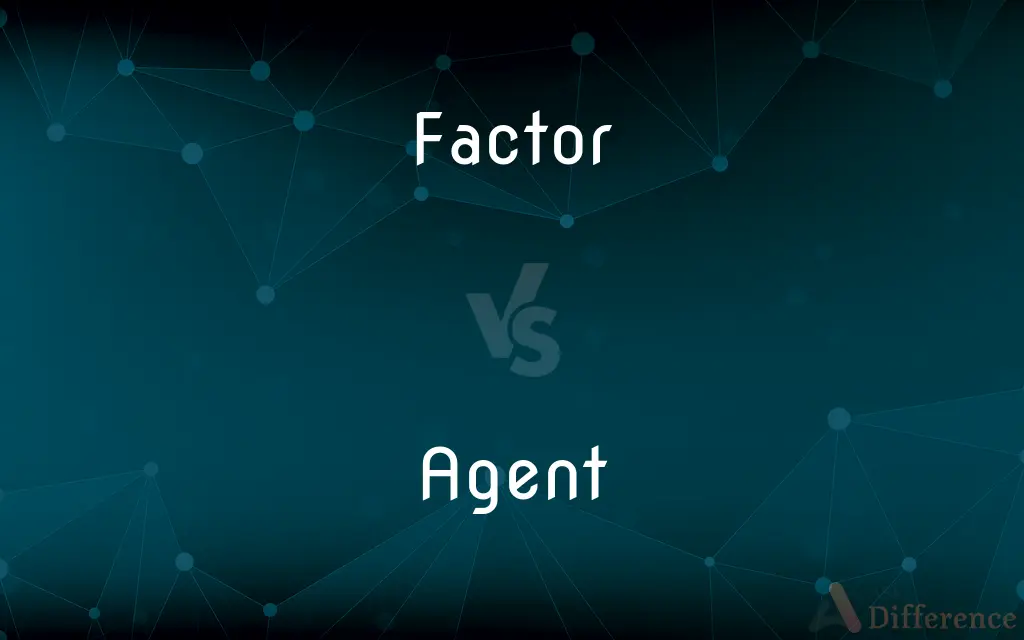Factor vs. Agent — What's the Difference?
By Tayyaba Rehman & Maham Liaqat — Updated on March 17, 2024
A factor is an element that contributes to a particular result or situation, while an agent is a representative or intermediary acting on behalf of others.

Difference Between Factor and Agent
Table of Contents
ADVERTISEMENT
Key Differences
Factors are elements, circumstances, or influences that contribute to a result or condition. They are often part of a larger process or system, influencing outcomes in various ways. Agents, on the other hand, are individuals or entities that act on behalf of others, often facilitating transactions, negotiations, or changes.
In mathematics and science, a factor is a component that, when multiplied with others, produces a given result. In economics, a factor can refer to an element of production (land, labor, capital). Agents, in contexts like real estate or insurance, represent clients in transactions, providing expertise and negotiation skills.
Factors are typically passive elements that contribute to a situation without active intervention. Agents are active participants who perform actions or make decisions on behalf of others, often with a certain degree of authority or autonomy.
Understanding the difference between factors and agents is crucial in various fields. In scientific research, identifying factors helps in understanding causal relationships, while in business, agents can facilitate transactions and represent interests.
Comparison Chart
Definition
Element contributing to a result or situation
Representative acting on behalf of others
ADVERTISEMENT
Role
Passive influence
Active participation
Context
Various fields (science, economics, etc.)
Business, law, real estate, etc.
Nature
Often an inherent part of a process
Performs actions or makes decisions
Examples
In production: land, labor, capital
Real estate agent, insurance agent
Compare with Definitions
Factor
In biochemistry, a substance that participates in a process without being consumed.
Coagulation factors play a vital role in blood clotting.
Agent
In chemistry, a substance that brings about a chemical reaction without being affected itself.
An oxidizing agent facilitates the oxidation process in a reaction.
Factor
A contributing element in a situation or system.
Weather is a significant factor in agricultural productivity.
Agent
An individual or entity authorized to act on behalf of another.
The literary agent negotiated the publishing contract for the author.
Factor
In mathematics, a number or quantity that, when multiplied with another, produces a given result.
In the expression 4 x 5 = 20, both 4 and 5 are factors of 20.
Agent
In law, someone who has the power to act for another in legal or financial matters.
The attorney was appointed as the agent under the power of attorney.
Factor
An element of production in economics, such as land, labor, or capital.
Capital investment is a key factor in business expansion.
Agent
In espionage, a person who collects and relays intelligence.
The agent gathered crucial information behind enemy lines.
Factor
A circumstance that influences the outcome of a process.
The patient's age was a crucial factor in determining the treatment plan.
Agent
In real estate, a professional who represents buyers or sellers.
The real estate agent provided valuable market insights to the homebuyer.
Factor
A circumstance, fact, or influence that contributes to a result
His skill was a factor in ensuring that so much was achieved
She worked fast, conscious of the time factor
Agent
A person who acts on behalf of another person or group
In the event of illness, a durable power of attorney enabled her nephew to act as her agent
Factor
A number or quantity that when multiplied with another produces a given number or expression
An amount that exceeds it by a factor of 1000 or more
Agent
A person or thing that takes an active role or produces a specified effect
Universities are usually liberal communities that often view themselves as agents of social change
Factor
A level on a scale of measurement.
Agent
One that acts or has the power or authority to act.
Factor
An agent who buys and sells goods on commission
His father was chief factor for the Hudson's Bay Company
Agent
One empowered to act for or represent another
An author's agent.
An insurance agent.
Factor
Another term for factorize
Last year researchers factored a number 155 digits long
Agent
A means by which something is done or caused; an instrument.
Factor
(of a company) sell (its invoices) to a factor
They collected rents while he factored these forfeited estates
Agent
A force or substance that causes a change
A chemical agent.
An infectious agent.
Factor
One that actively contributes to an accomplishment, result, or process
"Surprise is the greatest factor in war" (Tom Clancy).
Agent
A representative or official of a government or administrative department of a government
An FBI agent.
Factor
One who acts for someone else; an agent.
Agent
A spy.
Factor
One who purchases accounts receivable at a discount.
Agent
(Linguistics) The argument that expresses the means or cause of an action or event described by a phrase or clause. The noun John is the agent in the clause John threw the ball.
Factor
(Mathematics) One of two or more quantities that divides a given quantity without a remainder. For example, 2 and 3 are factors of 6; a and b are factors of ab.
Agent
To act as an agent or representative for
Who will agent your next book?.
Factor
A quantity by which a stated quantity is multiplied or divided, so as to indicate an increase or decrease in a measurement
The rate increased by a factor of ten.
Agent
To act as an agent or representative.
Factor
A gene. No longer in technical usage.
Agent
One who exerts power, or has the power to act
Factor
To determine or indicate explicitly the factors of
If you factor 70, you get 2, 5, and 7.
Agent
One who acts for, or in the place of, another (the principal), by that person's authority; someone entrusted to do the business of another
Factor
To engage in purchasing accounts receivable at a discount.
Agent
A person who looks for work for another person
Factor
(obsolete) A doer, maker; a person who does things for another person or organization.
The factor of the trading post bought the furs.
Agent
Someone who works for an intelligence agency
Factor
An agent or representative.
Agent
An active power or cause or substance; something (e.g. biological, chemical, thermal, etc.) that has the power to produce an effect
Factor
(legal)
Agent
(computing) In the client-server model, the part of the system that performs information preparation and exchange on behalf of a client or server. Especially in the phrase “intelligent agent” it implies some kind of autonomous process which can communicate with other agents to perform some collective task on behalf of one or more humans.
Factor
A commission agent.
Agent
(grammar) The participant of a situation that carries out the action in this situation, e.g. "the boy" in the sentences "The boy kicked the ball" and "The ball was kicked by the boy".
Factor
A person or business organization that provides money for another's new business venture; one who finances another's business.
Agent
(gambling) A cheat who is assisted by dishonest casino staff.
Factor
A business organization that lends money on accounts receivable or buys and collects accounts receivable.
Agent
Acting; - opposed to patient, or sustaining, action.
Factor
One of the elements, circumstances, or influences which contribute to produce a result.
The greatest factor in the decision was the need for public transportation.
The economy was a factor in this year's budget figures.
Agent
One who exerts power, or has the power to act; an actor.
Heaven made us agents, free to good or ill.
Factor
(mathematics) Any of various objects multiplied together to form some whole.
3 is a factor of 12, as are 2, 4 and 6.
The factors of the Klein four-group are both cyclic of order 2.
Agent
One who acts for, or in the place of, another, by authority from him; one intrusted with the business of another; a substitute; a deputy; a factor.
Factor
(causal analysis) Influence; a phenomenon that affects the nature, the magnitude, and/or the timing of a consequence.
The launch temperature was a factor of the Challenger disaster.
Agent
An active power or cause; that which has the power to produce an effect, such as a physical, chemical, or medicinal agent; as, heat is a powerful agent.
Factor
(economics) A resource used in the production of goods or services, a factor of production.
Agent
A chemical substance having biological effects; a drug.
Factor
(Scotland) A steward or bailiff of an estate.
Agent
An active and efficient cause; capable of producing a certain effect;
Their research uncovered new disease agents
Factor
(transitive) To find all the factors of (a number or other mathematical object) (the objects that divide it evenly).
Agent
A substance that exerts some force or effect
Factor
To be a product of other objects.
Agent
A representative who acts on behalf of other persons or organizations
Factor
To sell a debt or debts to an agent (the factor) to collect.
Agent
A businessman who buys or sells for another in exchange for a commission
Factor
One who transacts business for another; an agent; a substitute; especially, a mercantile agent who buys and sells goods and transacts business for others in commission; a commission merchant or consignee. He may be a home factor or a foreign factor. He may buy and sell in his own name, and he is intrusted with the possession and control of the goods; and in these respects he differs from a broker.
My factor sends me word, a merchant's fledThat owes me for a hundred tun of wine.
Agent
Any agent or representative of a federal agency or bureau
Factor
A steward or bailiff of an estate.
Agent
The semantic role of the animate entity that instigates or causes the hapening denoted by the verb in the clause
Factor
One of the elements or quantities which, when multiplied together, form a product.
Factor
One of the elements, circumstances, or influences which contribute to produce a result; a constituent; a contributory cause.
The materal and dynamical factors of nutrition.
Factor
To resolve (a quantity) into its factors.
Factor
Anything that contributes causally to a result;
A number of factors determined the outcome
Factor
An abstract part of something;
Jealousy was a component of his character
Two constituents of a musical composition are melody and harmony
The grammatical elements of a sentence
A key factor in her success
Humor: an effective ingredient of a speech
Factor
Any of the numbers (or symbols) that form a product when multiplied together
Factor
One of two or more integers that can be exactly divided into another integer;
What are the 4 factors of 6?
Factor
A businessman who buys or sells for another in exchange for a commission
Factor
An independent variable in statistics
Factor
(genetics) a segment of DNA that is involved in producing a polypeptide chain; it can include regions preceding and following the coding DNA as well as introns between the exons; it is considered a unit of heredity;
Genes were formerly called factors
Factor
Resolve into factors;
A quantum computer can factor the number 15
Common Curiosities
How does an agent operate in the business world?
In business, an agent acts on behalf of individuals or companies, negotiating deals, making transactions, and providing expertise.
What distinguishes a real estate agent's role?
A real estate agent represents clients in the buying, selling, or renting of properties, offering negotiation, market knowledge, and transaction facilitation.
How do agents get compensated?
Agents are typically compensated through commissions, fees for services, or salaries, depending on their role and industry.
What is a factor in a scientific context?
In science, a factor is an element that influences the outcome of an experiment or study, such as temperature or pressure.
Can a factor also be an active agent?
Typically, factors are considered passive elements, while agents are active. However, in some contexts, like biochemistry, a factor can act in a process.
How do factors contribute to a result?
Factors contribute by being part of the conditions, elements, or influences that lead to a particular outcome or result in a process.
Are factors always tangible?
Factors can be both tangible, like a chemical substance, or intangible, like social influence or psychological state.
How do environmental factors impact business?
Environmental factors, such as climate change, regulations, and market trends, can significantly affect business operations and strategy.
What training do agents typically need?
Agents often require specialized training and licensing, depending on their field, such as real estate, insurance, or law.
What is the role of a factor in production?
In production, factors like land, labor, and capital contribute to the creation of goods and services.
What is the significance of agents in international relations?
Agents in international relations, such as diplomats or emissaries, play crucial roles in negotiations, representing their country's interests abroad.
What responsibilities do agents have?
Agents have responsibilities to their principals, including acting in their best interests, maintaining confidentiality, and providing accurate information.
What legal authority do agents have?
Agents can have various levels of legal authority, from limited actions to comprehensive decision-making, depending on their agreement with the principal.
Can an individual be both a factor and an agent?
While an individual might be a factor in a process due to their influence, as an agent, they actively make decisions and take actions on behalf of others.
How do cultural factors influence behavior?
Cultural factors, including traditions, values, and norms, significantly influence individual and collective behaviors.
Share Your Discovery

Previous Comparison
Dampener vs. Damper
Next Comparison
Hysteroscopy vs. ColposcopyAuthor Spotlight
Written by
Tayyaba RehmanTayyaba Rehman is a distinguished writer, currently serving as a primary contributor to askdifference.com. As a researcher in semantics and etymology, Tayyaba's passion for the complexity of languages and their distinctions has found a perfect home on the platform. Tayyaba delves into the intricacies of language, distinguishing between commonly confused words and phrases, thereby providing clarity for readers worldwide.
Co-written by
Maham Liaqat















































